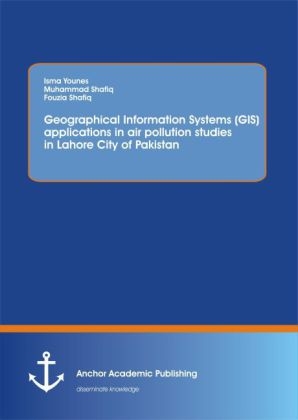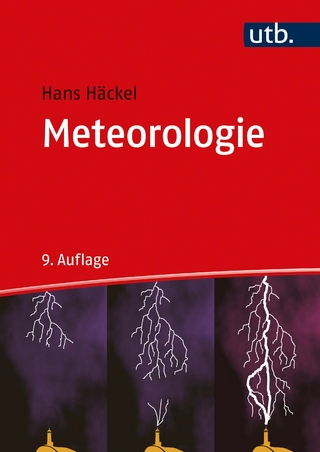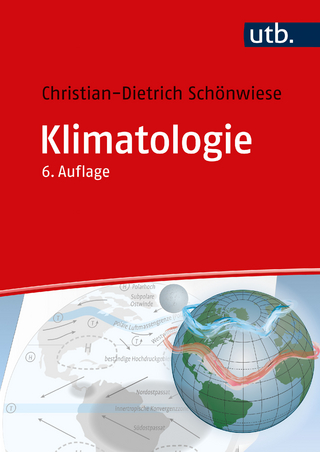
Using Geographical Information Systems (GIS) to study the concentration of major air pollutants in Lahore City of Pakistan
Anchor Academic Publishing (Verlag)
978-3-95489-404-8 (ISBN)
Dr. Isma Younes has a PhD in Geography and is an Assistant Professor at University of the Punjab Lahore, Pakistan.
Dr. rer. nat. Muhammad Shafiq has a PhD in Meteorology from University of Innsbruck, Austria and is a Research Scientist at Space and Upper Atmosphere Research Commission (SUPARCO), Karachi, Pakistan.
Dr. Fouzia Shafiq has a PhD in Botany from University of Karachi and is an Assistant Professor of Biological Sciences at University of Sargodha, Sargodha City, Pakistan.
Text Sample:
Chapter 1, 1.1 Global Effects:
There are several major environmental problems such as smog, acid rain, the greenhouse effect and "holes" in the ozone layer which are the focus of the environment due to their harmful effects on the man and its environment. Acid rain is one of the major environmental problems, which has always being the focus of the scientists. Chemical analysis of acid precipitation reveals the presence of sulphuric acid and nitric acid. In general about two-third of the acidity is due to sulphuric acid and one-third to nitric acid. Both sulphuric dioxide and nitrogen dioxide gradually react with water vapour and, through a number of steps, become acids. Precipitation becomes acidic, as it flushes these acids from the atmosphere. The pH of the precipitation depends on both the amount of acid and the amount of water. Fog and mist may be mostly acidic because the acid is disclosed in relatively little water. Some scientists believe that inhalation of highly acidic fog particles and dry acid particles is a major source of breathing and respiratory problems (Dockery et. al., 1994; Thurston, 1991). In addition there is evidence that inhalation of such particles renders lung tissues more susceptible to the carcinogenic effects of to the pollutants. Climate has always been affected by the human activities (Shafiq, Santos et. al., 2011). However with growth of population and their needs, such as land use and transportation the climatic conditions are being altered very rapidly in the present time. This alteration is being caused by the addition of carbon dioxide and certain other gases to the atmosphere, which causing the earth's climate to warm resulting in rising sea levels and insecure weather changes throughout the world. This carbon dioxide effect is also known as 'the greenhouse effect', because it is analogues to solar heating, which occurs in the green house or in the car when it left parked in the sea. Sunlight enters the glasses and absorbed. As the surface became warm, they radiate energy as infrared or heat radiation. The nature of the glass is that, it is highly transparent; it tends to block the infrared radiation. Therefore the energy that enters as light is trapped and causes the temperature to rise. The carbon dioxide acts as a heat trapper and initiates to increase the temperature level in the lower atmosphere. On the global level, carbon dioxide in the atmosphere plays a role analogue to the glass. Light energy comes through the atmosphere. It is absorbed and converted into heat energy at the surface and exists as infrared radiation; the natural gases in the atmosphere do not. As carbon dioxide absorbs the infrared radiation, it becomes warms and thus in turn warms the rest of the atmosphere. Consequently, it follows that greater the amount of infrared that will be absorbed and the warmer will be the atmosphere. Climatologists are now in general agreement that if a doubling of carbon dioxide level to 600ppm is used as a reference point, the overall warming will be between 1.5 oC and 4.5 oC, warming in likely to be more pronounced in polar region as much as 10 oC , and less pronounced in equatorial region 1 oC - 2 oC. Depletion of ozone shield is a serious problem in the atmosphere. Radiation from the sun includes the ultraviolet light along with visible light. Ultraviolet is like light radiation but the wavelengths are slightly shorter than violet light, which are the shortest wavelengths seen by the human eye; while ultraviolet light is not visible, the rays are more energetic than those of visible light. On penetrating the atmosphere and being absorbed by biological tissues, they actually destroy protein and DNA molecule.
| Erscheint lt. Verlag | 20.9.2016 |
|---|---|
| Sprache | englisch |
| Maße | 155 x 220 mm |
| Gewicht | 184 g |
| Themenwelt | Naturwissenschaften ► Geowissenschaften ► Allgemeines / Lexika |
| ISBN-10 | 3-95489-404-1 / 3954894041 |
| ISBN-13 | 978-3-95489-404-8 / 9783954894048 |
| Zustand | Neuware |
| Haben Sie eine Frage zum Produkt? |
aus dem Bereich


